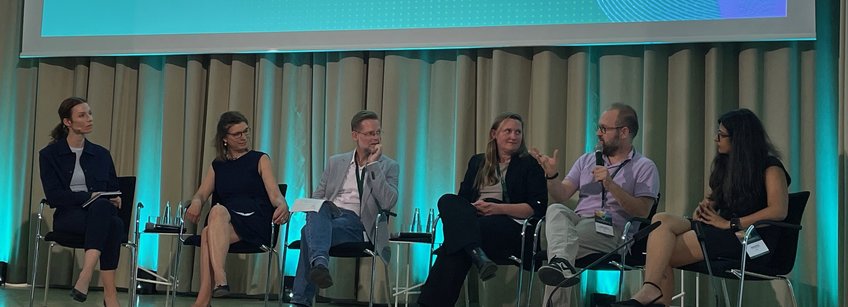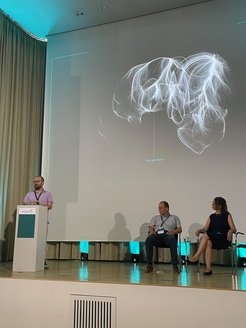
“Building Bridges” - Meeting of Minerva and Max Planck Alumni in Berlin
10th MPA-Symposium “Sustainability” - Former Minerva Fellows attend for the first time
Building bridges – that was an important message at this year's Max Planck Alumni Symposium at the Harnack House in Berlin from June 30th to July 1st, which was open to Alumni of the Minerva Foundation for the first time.
In a keynote speech, Managing Director Ulman Lindenberger recounted the Minerva Foundation's beginnings in 1959, when a delegation from the Max Planck Society travelled to Israel, and described the development of a successful German-Israeli cooperation that is still supported by three pillars today: the Minerva Fellowship Programme, the Minerva Weizmann Programme and the Minerva Center Programme.
According to Lou Bohlen, head of the Minerva Office in Munich, the Minerva Alumni Programme will serve as a fourth pillar in the future: ‘Our Minerva Fellows have enormous potential, both academically and culturally. The Minerva Alumni Programme wants to tap into this potential as so-called bridge builders.’

The Minerva Fellowship Programme is one of the generators of academic excellence. A representative of this excellence was also present at the Alumni Symposium in Berlin: Noam Libeskind, from the Leibniz Institute for Astrophysics. He came to Germany as a Minerva Fellowship Holder. He stayed, now being the head of the Cosmography and Large-scale Structure group in the Cosmology and High-energy Astrophysics section at the Leibniz Institute for Astrophysics in Potsdam. Noam presented his path in science as part of the keynote speech as well as in the panel discussion later on, where another Minerva alumna was also present: Lena Molitor, who finished her fellowship in August last year with the Minerva Foundation.
Mentoring was an important topic in the panel discussion in the early afternoon, in which both Minerva alumni talked about their experiences during their Minerva Fellowship as well.
It became clear during the symposium that networking among Minerva and Max Planck alumni played a prominent role. All participants emphasized the importance of annual in-person meetings in various formats, such as workshops, lectures or simply exchanging ideas and contacts over dinner or lunch.
In future, there will be regular meetings as part of the new Minerva Alumni Programme. The Minerva Alumni format as a new programme will be part of the newly founded Max Planck Alumni Programme. The associated database, which is currently still in progress, is intended to enable former Minerva fellows to make professional contacts in the Max Planck community after their Minerva fellowship.












